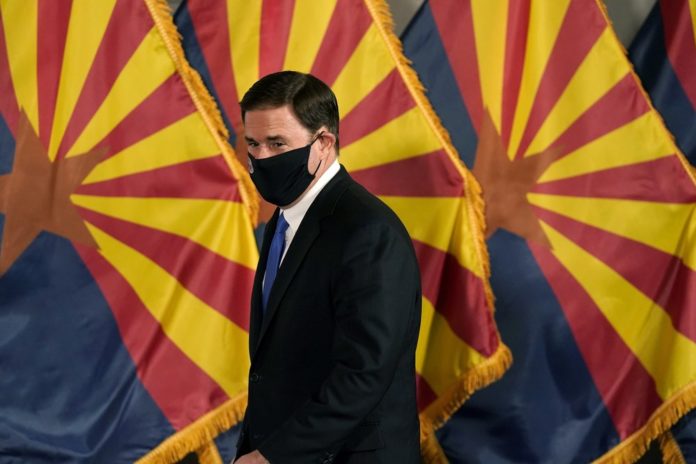
Top hospital officials across Arizona urged the state Wednesday to take more action to stop the spread of COVID-19, making a bleak projection that the health care system could go beyond capacity later this month.
Gov. Doug Ducey acknowledged “the numbers in Arizona are heading in the wrong direction,” but he declined to order a statewide mask mandate, curfew, or business lockdown.
“I don’t think the right answer is to throw hundreds of thousands of Arizonans out of work right before the holidays,” Ducey said.
Better enforcement of existing restrictions on restaurants, bars and gyms, along with local mask mandates and good hygiene, are sufficient, he said. Businesses that skirt safety protocols will face closure after a second offense, he said.
Banner Health, the state’s largest health system, is predicting it could surpass its hospital bed capacity as early as next week and 125% of bed capacity by mid-December. In November, its hospitals in Phoenix and Tucson saw COVID-19 hospitalizations jump as much as 95%. The same period also saw coronavirus patients go from roughly 25% of intensive care unit patients to 50%.
“All of the comments and statistics I’m sharing with you today paint a very grim picture that if the surge, which is currently in exponential growth, continues at its current pace, that this will become a very dire situation,” Dr. Marjorie Bessel, chief clinical officer for Banner Health, said during a media briefing.
Bessel was among leaders of eight major hospital systems who signed a letter Tuesday urging Dr. Cara Christ, Arizona Department of Health Services director, to establish tougher preventive measures. Some of the requests include a ban on indoor dining and group athletic events, curfews, and limiting gatherings to no more than 25 people.
So far, Tucson is the only city to issue a curfew. City council members voted unanimously Tuesday to establish a mandatory 10 p.m. to 5 a.m. curfew for three weeks beginning Friday. Ducey said he disagrees with Tucson’s approach but declined to say whether he believes it violates an executive order he signed to prohibit local governments from enacting health measures more stringent than his own, aside from a mask mandate.
Ducey did announce Wednesday that he’s devoting another $60 million to bring nurses from other states and $1 million for restaurants to buy furniture, heaters, and other equipment to facilitate outdoor dining. He said he’ll allow restaurants to expand outdoor seating into public rights of way.
Ducey also ordered more stringent protocols for outdoor events with more than 50 people, prohibiting local governments from approving large events unless organizers promise to follow recommendations from state and federal public health authorities.
The first doses of a COVID-19 vaccine are expected to arrive in Arizona in the coming weeks, though it will take months to get enough doses to inoculate everyone in the state. Ducey said he wants teachers to be prioritized to encourage schools, many of which are using remote instruction, to return to using classroom.
“We want our schools open and our teachers protected,” he said.
The vaccine will be free for everyone in Arizona, including people without insurance and those living in the country illegally.
The state reported Wednesday 3,840 additional confirmed cases and 52 more deaths. That raises Arizona’s totals since the pandemic began to 340,979 cases and 6,739 deaths.
Hospitalizations related to the coronavirus statewide reached 2,699 as of Tuesday, including 642 patients in intensive care unit beds. Hospitalizations peaked around 3,500 during a summer surge.
According to the state Department of Health Service’s coronavirus dashboard, 10% of all hospital acute-care beds and 10% of ICU beds remained available.
Health experts have said holiday travel and gatherings are expected to produce additional new cases and related hospitalizations over the next few weeks.
The number of infections is thought to be far higher because many people have not been tested, and studies suggest people can be infected with the virus without feeling sick.
The seven-day rolling average of daily new confirmed cases in Arizona rose over the past two weeks from 2,395 new cases per day on Nov. 17 to 4,324 per day on Tuesday, according to data from The COVID Tracking Project.
Republished with the permission of the Associated Press.














